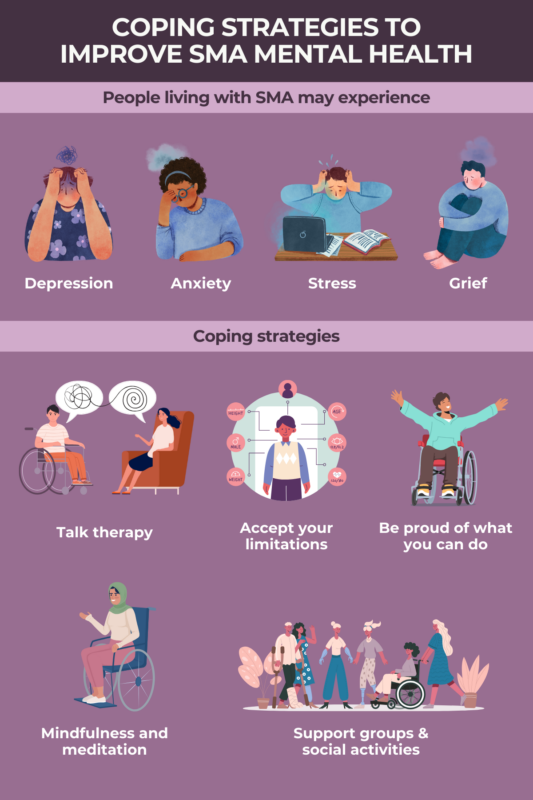
SMA and mental health
Learning that you’ve been diagnosed with spinal muscular atrophy (SMA) is life-altering.
SMA is a genetic, progressive disease that causes muscle weakness and atrophy throughout the body. Symptoms vary by SMA type, but usually include walking and breathing difficulties.
Dealing with the changes in your physical abilities and the eventual need for support in daily life can be very daunting. It’s not uncommon — or surprising — to find yourself dealing with mental health issues such as anxiety and depression. You may feel angry, scared, and uncertain about what your future will be like. It can happen to anyone at any age, and affect caregivers and siblings, too.
Infants and children with SMA types 1, 2, and 3 have been shown to experience anxiety and depression, and take longer to soothe than their healthy peers.
You should not suffer in silence or hope that these feelings will go away. Mental health treatment for those with SMA is a major unmet need. Talk to your doctor or a mental health professional about what you are experiencing.
Treatment may include psychotherapy, medications, support groups, and lifestyle changes.
Areti Vassilopoulos, PhD, is an assistant professor of Clinical Pediatrics and Child Psychology at Yale University and a dedicated psychologist for the Muscular Dystrophy Association (MDA) Care Center at Yale. She has evaluated, treated, and supported people with medical and psychosocial needs, including those with neuromuscular disease.
Dealing with stress, anxiety, and depression are very hard, Vassilopoulos says, especially when added to the physical and social factors that come with SMA.
“This is most common when there is worse physical health, school challenges, lack of specialized school support, and their caregivers’ own anxiety,” she says. ”All these factors are stressors, so understandably people experiencing them will feel anxious, stressed or sad.”
It is key, she says, that those with SMA and their caregivers have strong support, as it takes a team to be mentally resilient.
After the diagnosis
People react in different ways to a life-changing diagnosis like SMA. Often, they cycle through varying phases of grief, which is often described as having five stages:
- denial of the new reality
- anger
- bargaining for change
- depression
- acceptance.
These are all normal feelings that many people experience as they process the shock of the eventual changes in their health and life.
Mindy Henderson, who was diagnosed with SMA type 2 when she was 15 months old, says her physical health is closely tied to her mental well-being.
“Living with spinal muscular atrophy, you never really escape it. I feel it every moment of every day; the heaviness of my body and the effort it takes to move any part of it,” Henderson says. “There are definite times when the emotional weight of that has been hard.”
According to Henderson, as she headed into her early to mid-40s, the progression of the disease became much more evident.
Now age 50 and the editor-in-chief of the Muscular Dystrophy Association’s Quest Media, she finds she needs help with tasks she used to be able to do herself, like fixing her hair and putting on makeup.
“I walked for a very brief period before I was diagnosed, and stopped walking shortly thereafter. I have lived my life from a wheelchair,” says the Austin, Texas, resident. “To feel physically weak and vulnerable, to have to ask for help regularly, to have caregivers in and out of my home several times a day, creates the potential to become very frustrated and depressed.”
Then there is the fear of the future and her prognosis.
“This year, I began having difficulty driving,” Henderson says. “And when things like that happen, you can’t help but wonder what you will lose next.”
Having a physical disability is a risk factor for depression and other emotional challenges, Vassilopoulos says, as it can be challenging to engage in activities with other people.
“They might spend more time alone, which contributes to low mood,” she says. “That’s why it’s important to find ways to be creative about activities, hobbies, skills, and amplifying individual strengths.”
Deteriorating physical health, especially a loss of independence, have been shown to have the greatest effect on the general well-being of adults with SMA.
To counteract this, independence and competence in daily tasks, participating in social activities, along with determination, an optimistic attitude toward life, and resilience, have been shown to help when facing difficult treatment decisions and adjusting your hopes for the future.
Depression
Depression is characterized by a profound lack of energy (fatigue) accompanied by feelings of sadness and a loss of interest or pleasure in activities.
Focusing on fatigue as a symptom of depression for someone with SMA is tricky, Vassilopoulos explains. While loss of energy is a symptom of depression, it is also a common SMA symptom.
“Fatigue and depression or low mood can cycle together, as it’s hard to want to do or initiate doing enjoyable activities if you’re feeling fatigued,” she says. “This can lead to less enjoyment and more withdrawal.”
Spending more time alone can add to feelings of sadness and loneliness, she says.
“It’s important to try hard to break that cycle by being intentional to engage in at least one enjoyable activity each day,” Vassilopoulos says. “And to discover new things that could light that spark.”
Symptoms of depression generally last longer than two weeks and may include:
- lack of interest or pleasure in activities
- lack of energy
- loss of appetite
- sadness, emptiness
- irritability
- insomnia or oversleeping
- concentration problems
- feelings of worthlessness or guilt
- suicidal thoughts.
Mental Health America offers an online screening test for depression for people who have been having symptoms.
If you’ve had symptoms of depression for more than two weeks, contact a healthcare professional. If you think you may be in crisis, call or text 988. Signs of a crisis include:
- not being able to get out of bed
- not going to work
- not being able to do everyday tasks.
If you are having suicidal thoughts, call the National Suicide Prevention line at 1-800-273-8255 or go online at suicidepreventionlifeline.org.
Anxiety
There’s also a high prevalence of anxiety in people living with SMA. Caregivers and siblings of children affected by SMA may also find themselves dealing with anxiety.
Anxiety is an emotional state that involves an inability to control your thoughts. You feel tense and worried, especially about possible future challenges. Generalized anxiety can seem illogical and make you feel overwhelmed (may have a sensation of suffocating) and exhausted.
Other symptoms include:
- sweating
- trembling
- dizziness
- rapid heartbeat
- higher than usual blood pressure.
Anxiety can be treated with therapy, medication and lifestyle changes, such as trying relaxation techniques and meditation. You may also want to join a support group.
Vassilopoulos recommends coping strategies for helping you relax. They include:
- deep, slow breathing (from your diaphragm)
- positive self-talk
- mindfulness
- active distraction like journaling, drawing, or going outside
- creating scripts for responding to common uncomfortable questions
- practicing doing the thing that makes you anxious.
Daily coping strategies for anxiety and depression
Coping strategies for mental health issues such as anxiety and depression can help you better manage the stresses of daily life. They can also help you deal with SMA symptoms and living with SMA. To cope, you may:
- try to be accepting of your physical limitations
- refrain from blaming yourself for changes in what you can’t do
- be proud of what you can do
- resist the urge to compare yourself to others.
Henderson says she was raised in a family that taught her not to feel sorry for herself, and she was not allowed to not do something just because it was hard.
She went to MDA summer camp starting when she was 10. She said it was pivotal in teaching her to see all the possibilities for her life that still existed, despite her physical limitations.
“These early years did a lot to instill a positive mentality in me,” she says. “Over the years, I have become fairly self-aware and able to notice when I am getting down or when my thoughts are heading in the wrong direction.”
She uses a “small toolbox” of strategies to boost her mood, such as:
- singing along with a peppy song list on Spotify
- calling a friend and chat
- watching a show she enjoys
- going outside
- watching animals play and finding joy in their happiness
- practicing meditation, including gratitude practice.
Other coping skills include:
- planning your day
- breaking down a problem into steps and finding a solution for each part
- setting achievable goals
- writing in a journal or blog
- making art or playing a musical instrument.
Try to avoid unhealthy ways of coping, such as avoidance, anger, misuse of substances like alcohol and drugs, overeating, or self-harm.
Instead, talk to a friend about your problems, express your feelings better, and engage in activities and relaxation techniques that calm your mind.

Counseling and therapy
Getting in touch with your feelings may require working with a mental health professional in counseling and therapy sessions.
Awareness is always the starting point of change, Vassilopoulos says.
“It is important to look for ‘evidence-based’ as the keyword when searching for a provider and these methods,” she says. “This signals that research has been done to show that the treatment is indeed effective.”
Health or rehabilitation psychologists for adults and pediatric health psychologists for children are specialists who work with individuals with chronic conditions, such as SMA.
Psychotherapy methods depend on the treatment target. All should be evidence-based (proven in studies to have effective results). Strategies include:
- cognitive behavioral therapy for various types of anxiety such as generalized anxiety, social anxiety, and phobias
- cognitive behavioral therapy for depression
- exposure and response prevention for treating symptoms of obsessive-compulsive disorder
- systematic desensitization to help people better handle uncomfortable or anxiety-provoking medical procedures and treatments
- acceptance and commitment therapy, which is less structured than cognitive behavioral therapy or exposure and response prevention, but rather is an action-oriented, values-based treatment.
Supportive psychotherapy is another way to treat SMA mental health issues. The focus is on emotional support, guidance, and learning coping mechanisms for managing emotions and concerns.
Therapy can also help you figure out what you value most, such as whether you want to learn new skills, grow relationships, or advance in your school or career.
“Living in line with values contributes to improved mental health. Use skills to help you manage if you’re feeling anxious or sad, such as challenging negative thoughts and becoming your own cheerleader,” Vassilopoulos says. “Lastly, be open to all levels of support, whether it’s self-care, support from your inner circle, or professional evidence-based psychotherapy.”
Vassilopoulos also encourages leaning into your social support, making time to spend with friends and loved ones, and making time for yourself.
Henderson says she has had therapy over the years to help her process some of the challenges around living with SMA.
“My husband, my friends, and my family are all great support to me. And again, don’t underestimate the power of a pet!” she says, adding she has two dogs and a cat as companions.
Support groups
Joining a support group can lead to greater psychosocial well-being. SMA support groups offer interaction with healthcare experts and fellow people living with SMA, helping form a sense of community.
Your healthcare team is a good source for referrals to in-person SMA support groups. There are also online groups in most U.S. states, as well as internationally.
SMA News Today offers online forums and a Facebook page for making social connections, reading news about treatments, assistive technology and equipment, learning about awareness and advocacy, getting life advice, and joining general chats.
SMA support groups are also offered by:
- Muscular Dystrophy Association: Contact the MDA Resource Center by email at [email protected] or call 833-ASK-MDA1
- Cure SMA and their SMA Care Centers.
You can also search on social media, such as Facebook, for “spinal muscular atrophy support,” to find private groups of people with the different types of SMA, or to discuss approved medications, experimental treatments, and non-drug treatments such as physiotherapy.
Lifestyle changes
Lifestyle changes to help improve the mental health of someone living with SMA should align with your interests and abilities.
Some ways to improve SMA mental health include:
- increasing your social activities
- taking care of your health
- making a daily plan
- exercising as allowed
- getting enough quality sleep
- eating a healthy diet.
Vassilopoulos recommends some other ways to boost your mental health and “fill your happiness cup” such as:
- organizing your daily and weekly goals on paper or computer, so the list can be reviewed
- being consistent every day for tasks that need to be done and that includes something you enjoy doing
- looking for new and enjoyable activities
- taking care of your body, as health challenges associated with SMA and its symptoms can make it even more difficult
- intentionally making time for socializing on the phone, online and, if possible, in person.
Henderson adds that nutritious and flavorful food can be medicine, along with other methods she’s worked out for herself.
“I’ve done a bit of research about mood-boosting foods and do my best to eat a very healthy diet to stay both physically and mentally healthy,” she says. “Between that, regular meditation and making sure I always get a good night’s sleep are things that have been within my span of control to create a lifestyle that reinforces good mental health.”
Other suggestions are to minimize your exposure to infection, use assistive devices, and save your energy for required tasks or enjoyable activities. You should also talk with supportive friends and family who can help you deal with feelings of depression, fatigue, and anxiety.
What to do in a mental health emergency
If your behavior and thoughts are preventing you from functioning, and your feelings of distress are overwhelming, you might be having a mental health emergency (or crisis).
The most common sign of a mental health crisis is “a clear and abrupt change in behavior,” according to the American Psychological Association.
A mental health crisis warning signs include:
- inability to function in daily tasks or take care of hygiene
- self-medication or self-harm
- intense changes in mood
- feeling increasingly agitated, angry, or violent
- withdrawal from others
- hallucinations or delusions
- paranoia
- suicidal thoughts.
If you are in immediate need of medical help or if someone else is in danger, call 911. When speaking with 911, say that there is a mental health crisis, so the appropriate service is connected, such as a crisis intervention team.
Other crisis intervention services are available at a walk-in psychiatric urgent care or hospital emergency department.
If you are having suicidal thoughts, get immediate help. Speak or text with a counselor at a crisis line by:
- Calling or texting the 988 Suicide and Crisis Lifeline in the U.S. at 988 or 800-273-8255.
- Reaching out to the Veterans Crisis Line by calling 988 and pressing 1.
- Sending a text to the Crisis Text Line at 741741 in the U.S. and Canada.
- Looking internationally for country-specific crisis text lines.
- Finding country-specific crisis hotlines at Suicide Stop or Befrienders Worldwide.
SMA News Today is strictly a news and information website about the disease. It does not provide medical advice, diagnosis, or treatment. This content is not intended to be a substitute for professional medical advice, diagnosis, or treatment. Always seek the advice of your physician or other qualified health provider with any questions you may have regarding a medical condition. Never disregard professional medical advice or delay in seeking it because of something you have read on this website.
FAQs about SMA and mental health
Living with spinal muscular atrophy (SMA) means dealing with a progressive disease that decreases physical abilities over time. Feelings of anger and sadness caused by an SMA diagnosis can lead to depression. Symptoms include a lack of interest in activities, loss of appetite, feelings of emptiness and irritability, oversleeping or insomnia, concentration problems and fatigue. If feelings of depression last longer than two weeks, contact a mental health professional. If you have thoughts of self-harm or suicide, call the National Suicide Prevention Line at 1-800-273-8255 or go online at suicidepreventionlifeline.org.
Fatigue is a common complication of living with spinal muscular atrophy (SMA). It also is a symptom of depression. Other mental health symptoms include anxiety and stress.
In the U.S., Medicare Part B helps cover the services of mental health counseling. Medicare Advantage can cover services not included in original Medicare. According to the Affordable Care Act, all health plans bought through the Health Insurance Marketplace at healthcare.gov must include coverage for mental health as an essential benefit. Private health insurance plans vary in mental health coverage, including workplace plans.
Yes. While spinal muscular dystrophy (SMA) type 4 is one of the rarest forms of the disease, it can be diagnosed in adults, usually after age 35. People with SMA type 4 often don’t lose their ability to walk and their lifespan usually is not affected by SMA.
Yes, living with the stress of physical changes and future uncertainty caused by a spinal muscular atrophy (SMA) diagnosis and SMA symptoms can trigger anxiety in people living with the disease, their siblings, and their caregivers. Signs of anxiety include an inability to control thoughts, which may seem like they’re illogical. You may feel tense, worried, exhausted, and as if you are suffocating. Anxiety can cause symptoms such as sweating, trembling, dizziness, rapid heartbeat, and higher-than-usual blood pressure.
Related Articles

 Fact-checked by
Fact-checked by 









